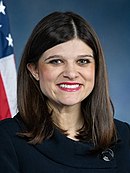Michigan Democratic Party
This article has multiple issues. Please help improve it or discuss these issues on the talk page. (Learn how and when to remove these messages)
|
Michigan Democratic Party | |
|---|---|
 | |
| Chairperson | Lavora Barnes |
| Governor of Michigan | Gretchen Whitmer |
| Lieutenant Governor of Michigan | Garlin Gilchrist |
| Senate Leader | Jim Ananich |
| House Leader | Donna Lasinski |
| Founded | 1848 |
| Headquarters | Lansing, Michigan |
| Ideology | Modern liberalism Social liberalism Progressivism |
| Political position | Center to center-left |
| National affiliation | Democratic Party |
| Colors | Blue |
| Michigan House of Representatives | 53 / 110
|
| Michigan Senate | 16 / 38
|
| Statewide Executive Offices | 4 / 4
|
| U.S. House of Representatives | 7 / 14
|
| U.S. Senate | 2 / 2
|
| Website | |
| Official Website | |
The Michigan Democratic Party is the affiliate of the Democratic Party in the state of Michigan. It is based in Lansing. Lavora Barnes is the party's current chair.[1] She was previously the party's Chief Operating Officer.[2] The party currently controls half of Michigan's U.S. House seats, both U.S. Senate seats, and all statewide offices, holding the offices of governor, secretary of state, and attorney general.
Starting in January 2023 as a result of the 2022 elections, the party will hold a government trifecta in the state, with new majorities in both chambers of Michigan Senate and Michigan House of Representatives, as well as continuous control of the governorship and all other executive statewide offices. Additionally, the Democratic Party will hold a majority of Michigan's seats in the U.S. House of Representatives, as well as both of U.S. Senate seats. As such, it is currently the state's dominant party.
Structure
Residents of the state of Michigan at least 16 years of age are eligible for party membership; no financial contribution is required.[3] Generally, a person is required to have been a member for at least 30 days before a convention, caucus or meeting to receive voting privileges.[3]
Between state party conventions, the party is governed by the Democratic State Central Committee (DSCC). Delegates to the state central committee are elected at congressional district spring conventions in odd-numbered years.[3] Each district is entitled to at least four delegates consisting of two men and two women, with additional members allocated by congressional district based on the proportion of its vote for the Democratic nominee for President or Secretary of State at the last general election held.[3] Additional ex-officio with voting privileges include the Democratic National Committee members of the state and the officers of the DSCC. Any congressional district or county chairs having not been elected delegates also become DSCC ex-officio members, but without voting privileges.[3]
Leadership
The DSCC's officers are elected at the spring state convention in odd-numbered years by party members. Officers consists of a Chair, two Vice-Chairs one of each of a different gender and race, Secretary, Corresponding Secretary, Treasurer, and any additional officers as the convention deems proper.[3] Current major officers for the DSCC include:[4]
- Chair: Lavora Barnes
- 1st Vice-Chair: Mark LaChey
- 2nd Vice-Chair: Fay Beydoun
- 3rd Vice-Chair: Jonathan Kinloch
- 4th Vice-Chair: Chris Cracchiolo
- Youth Vice-Chair: Elena Greer
- Secretary: Mary Hall-Thiam
- Corresponding Secretary: Sami Khaldi
- Parliamentarian: Nathan Triplett
Officers of the DSCC plus the Democratic National Committee members constitute the Executive Committee of the DSCC. The Executive Committee addresses policy questions in between the meetings of the DSCC.[3] The Executive Committee is also responsible for drawing up a 2-year budget for the DSCC at a spring meeting in odd-numbered years.[3]
Current officeholders
The Michigan Democratic Party controls all four statewide offices and holds a minority of seats in the Michigan House of Representatives and Michigan Senate. Democrats hold both of Michigan's U.S. Senate seats, seven of the state's 14 U.S. House seats, and majorities on the elected governing boards of the University of Michigan, Michigan State University, and Wayne State University as well as a majority on the State Board of Education.[5]
Members of Congress
U.S. Senate
Democrats have controlled both of Michigan's seats in the U.S. Senate since 2000:
-
Senior U.S. Senator Debbie Stabenow
-
Junior U.S. Senator Gary Peters
U.S. House of Representatives
Out of the 14 seats Michigan is apportioned in the U.S. House of Representatives, seven are held by Democrats:
| District | Member | Photo |
|---|---|---|
| 5th | Dan Kildee |  |
| 8th | Elissa Slotkin |  |
| 9th | Andy Levin |  |
| 11th | Haley Stevens |  |
| 12th | Debbie Dingell |  |
| 13th | Rashida Tlaib |  |
| 14th | Brenda Lawrence |  |
Statewide offices
Democrats control all four of the elected statewide offices:
State Legislature
- Senate Minority Leader: Jim Ananich
- Assistant Senate Minority Leader: Jeremy Moss
- Senate Minority Floor Leader: Stephanie Chang
- Assistant Senate Minority Floor Leader: Mallory McMorrow
- Senate Minority Caucus Chair: Erika Geiss
- Senate Assistant Minority Caucus Chair: Paul Wojno
- Senate Minority Whip: Winnie Brinks
- Senate Assistant Minority Whip: Rosemary Bayer
- House Minority Leader: Donna Lasinski
- House Minority Floor Leader: Yousef Rabhi
See also
References
- ^ Gibbons, Lauren. "Lavora Barnes named Michigan Democratic Party chair". MLive.com. Retrieved 3 February 2019.
- ^ "News from the Michigan Democratic Party". Archived from the original on 2015-09-23. Retrieved 2015-09-18.
- ^ a b c d e f g h "Rules of the Michigan Democratic Party [2018]" (PDF). MIDems. Democratic State Central Committee. Retrieved 9 February 2021.
- ^ "Elected Officials". MIDems. Retrieved 9 February 2021.
- ^ Levin, Einhorn, Koby, Erin. "As the Michigan state school board shifts to Democratic control, meet the two new members". Chalkbeat. Retrieved 20 January 2019.
{{cite web}}: CS1 maint: multiple names: authors list (link)







